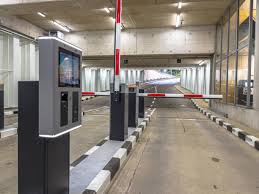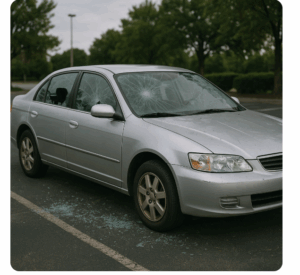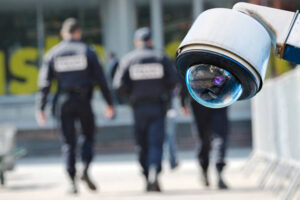Enhancing Safety in Parking Garages: The Critical Role of Security Guards in Preventing Crime, Trespassing, and Homeless Incidents

Parking garages, while essential to urban infrastructure, are often overlooked when it comes to security planning. Dimly lit corners, low foot traffic, and easy access points make parking structures vulnerable to various security threats, including theft, vandalism, loitering, and trespassing. Additionally, these areas can attract homeless individuals seeking shelter, which—while often stemming from systemic social issues—can lead to challenges related to safety, liability, and property maintenance.
Security guards play a crucial role in managing and mitigating these risks. With professional training, strategic patrols, and a visible presence, security personnel significantly enhance the safety and security of parking garages. This blog explores the top security concerns in parking structures and how security guards are an essential solution to protect people, property, and business reputation.
Why Parking Garages Are High-Risk Zones
Before diving into solutions, it’s important to understand why parking garages are often hotspots for crime and unwanted activity:
-
Low Visibility and Lighting: Many garages suffer from poor lighting, especially in corners, stairwells, and isolated levels.
-
Minimal Surveillance: Unlike retail spaces or office buildings, garages often have limited surveillance, creating blind spots.
-
Easy Access: Most garages are open to the public, allowing anyone to enter and remain unnoticed.
-
High Value Targets: Vehicles often contain valuables, making them prime targets for theft and break-ins.
-
Reduced Foot Traffic: Unlike busy retail stores or offices, garages have fewer people passing through, making it easier for criminals to act without witnesses.
These factors combine to create an environment ripe for criminal activity unless proactive security measures are implemented.
Common Threats in Parking Garages
1. Theft and Vehicle Break-Ins
One of the most common crimes in parking garages is theft—from breaking into cars to stealing parts like catalytic converters. Criminals see garages as a low-risk, high-reward opportunity, especially when the garage lacks security presence.
2. Assault and Personal Crime
Garages are often the setting for muggings, assaults, or other personal crimes. Individuals walking alone to or from their vehicles, especially at night, can become vulnerable targets.
3. Vandalism
Graffiti, property damage, and destruction of vehicles are all issues that plague poorly monitored garages, leading to costly repairs and loss of business reputation.
4. Trespassing and Unwanted Visitors
Uninvited individuals may enter a garage for various purposes—loitering, illegal activities, or as a hangout. These situations can escalate quickly without proper intervention.
5. Homeless Encampments and Shelter-Seeking
Many homeless individuals seek out parking garages for shelter, particularly during colder months. While this stems from a much larger social issue, their presence can raise safety concerns, generate liability for property owners, and lead to sanitation or fire hazards.
The Role of Security Guards in Parking Garage Safety
Professional security guards offer more than just a deterrent—they provide a hands-on, human solution to unpredictable and diverse threats.
1. Visible Deterrence to Crime
The mere presence of a uniformed guard can discourage criminal behavior. Would-be thieves and vandals are far less likely to act in a monitored environment. Guards provide a psychological deterrent, signaling to wrongdoers that their actions will not go unnoticed.
2. Routine and Random Patrols
Security guards conduct both routine and randomized patrols throughout the facility. These include checking stairwells, elevators, corners, and vehicle rows. Randomized routes make it difficult for potential offenders to predict patterns and find windows of opportunity.
3. Monitoring Entry and Exit Points
Security personnel can be stationed at entry and exit points to observe and question suspicious individuals or prevent unauthorized access. This helps filter out individuals who have no valid reason to be in the garage.
4. Surveillance System Support
Guards often work in conjunction with camera surveillance systems. They can monitor live feeds, respond to alerts, and report or intervene in real-time. Their ability to interpret situations that technology might misread is crucial—AI can detect motion, but it can’t understand context.
5. Managing Homeless Encounters Respectfully
Trained guards can approach homeless individuals in a humane and respectful way, encouraging them to leave without confrontation. In many cases, guards work with local outreach programs to direct individuals to appropriate shelters or resources. This approach helps maintain safety while showing empathy and professionalism.
6. Incident Documentation and Reporting
Security guards maintain detailed logs of incidents, visitor behavior, and suspicious activity. This documentation can be critical for legal matters, insurance claims, or identifying recurring issues. Their reports can also highlight infrastructure weaknesses like broken locks, malfunctioning lights, or blind spots in surveillance coverage.
7. Rapid Emergency Response
Whether it’s a medical emergency, a fire, or a violent incident, guards are trained to respond swiftly and effectively. Their presence ensures that help is dispatched quickly, minimizing potential harm or damage.
Security Guard Tactics That Work in Parking Garages

To effectively secure a parking garage, security guards must use a combination of visible presence and behind-the-scenes strategies:
-
Foot and Vehicle Patrols: Especially in large garages, guards should utilize both walking patrols and patrol vehicles or golf carts to cover more ground quickly.
-
Communication Tools: Radios, body cams, and mobile apps allow guards to stay connected, document incidents, and call for backup if needed.
-
Customer Service Approach: Guards can also serve as helpful contacts for visitors—assisting with directions, jump-starting cars, or escorting individuals safely to their vehicles.
-
Lighting Audits and Security Checks: Guards can report poor lighting, broken locks, or malfunctioning surveillance systems to facility management regularly.
-
Clear Trespass Protocols: With policies in place, guards know exactly how to handle loitering or trespassing situations, reducing guesswork and risk.
Benefits for Property Owners and Facility Managers
Hiring trained security guards for a parking garage isn’t just about safety—it’s also a business investment:
-
Reduced Crime Rates: Garages with a visible security presence report significantly fewer incidents.
-
Lower Liability: With guards on-site, property owners are better protected against lawsuits and insurance claims stemming from theft or personal injury.
-
Improved Tenant and Visitor Confidence: Whether it’s employees, customers, or residents, people feel safer knowing security is present.
-
Positive Business Image: Well-maintained and secured garages reflect a commitment to safety and professionalism—something that matters to tenants, clients, and city officials alike.
-
Support for Law Enforcement: Security guards can bridge the gap with local police, reporting ongoing issues or providing evidence and witness accounts when needed.
What to Look for in a Parking Garage Security Team
Not all security providers are created equal. When selecting guards for parking garage security, look for:
-
State Licensing and Certifications
-
Experience in Property and Garage Security
-
24/7 Availability for High-Traffic Garages
-
Professional Uniforms and Equipment
-
Customer Service and Conflict De-escalation Training
-
Strong Communication and Reporting Skills
-
Integration with Surveillance and Access Control Systems
Partnering with a reputable security company ensures that the guards assigned to your garage are trained, responsive, and aligned with your safety priorities.
Conclusion
Parking garages are essential, but they come with unique security challenges. From deterring theft and vandalism to managing homeless incidents and trespassers, the role of a professional security guard is indispensable. These trained individuals not only protect property but enhance public safety and create a sense of trust for anyone entering the facility.
Investing in security guards for parking garages isn’t just about preventing crime—it’s about fostering an environment where people feel safe, confident, and respected. With the right personnel, strategies, and ongoing support, parking garages can transform from high-risk zones into secure assets for property owners and the public alike.
If you’re seeking reliable, trained, and responsive security guards for your parking facility, reach out to Hub Security and Investigative Group. Our team specializes in securing commercial and residential properties across Boston and beyond, ensuring that every visitor and vehicle is protected with professionalism and care.
LINKS:
https://www.youtube.com/watch?v=J371QyHb55w
https://www.securityguardtrainingcentral.com/massachusetts-security-guard-training/

